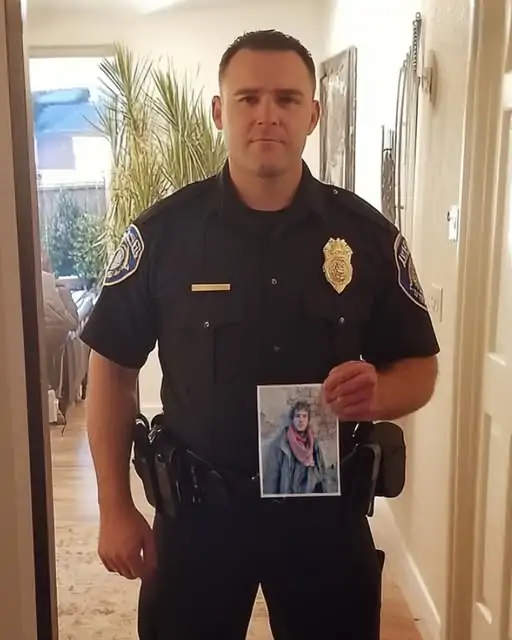It was one of those biting January afternoons when the cold seemed to seep through every layer, cutting down to your very bones. I had just finished running errands—groceries, dry cleaning—when I decided to stop by St. Peter’s Church. Something drew me there, perhaps the need for quiet reflection amidst life’s noise. Little did I know, that decision would change two lives forever.
As I climbed the church steps, I noticed him—a young man, no older than thirty, sitting hunched at the foot of the stairs. His coat was threadbare, his fingers red and raw as they fumbled with shoes barely held together by twine. His head was bare to the wind, his shoulders slumped in silent defeat.
For a moment, I hesitated. What if he didn’t want help? What if he was dangerous? But when he looked up, his hollow, dark eyes stopped me in my tracks. There was a fragility in his gaze that broke through my doubts. I crouched beside him, ignoring the cold stone biting at my knees.

“Hi there,” I said gently. “Can I help with your shoes?”
His eyes widened in surprise, as if he wasn’t used to being noticed. “You don’t have to—” he began.
“Let me,” I interrupted, my voice firm but kind. I untied the knotted string holding his shoes together, adjusting them as best I could. My fingers stung from the cold, but it didn’t matter.
When I finished, I pulled the scarf from my shoulders—a thick gray knit my husband, Ben, had given me years ago. It was my favorite, but he needed it more. Without a second thought, I draped it over his shoulders.
“Here. This will help,” I said.
His lips parted as if to protest, but no words came. Instead, I darted across the street to a café and returned moments later with a large cup of hot soup and tea. His trembling hands accepted them, and I scribbled my address on a scrap of paper.
“If you ever need a place to stay or someone to talk to,” I told him softly, “come find me.”
He stared at the paper, his voice cracking as he asked, “Why? Why are you doing this?”
His eyes glistened with unshed tears. “Thank you,” he whispered.
I walked away, glancing over my shoulder once to see him sipping the soup, huddled against the wind. I didn’t ask his name, and I didn’t expect to see him again.
Ten years passed. Life moved on, full of the joys and challenges that come with family, work, and routine. My husband and I celebrated twenty-two years of marriage. Our children, Emily and Caleb, were growing fast—Emily preparing for high school graduation, and Caleb navigating the chaos of being fourteen.
One quiet Tuesday evening, as I sat in the living room sorting through bills, there was a knock at the door. Opening it, I found a police officer standing on the porch. My heart leapt with panic, thoughts racing to my children.
“Good evening, ma’am,” he said. “Are you Anna?”
“Yes,” I replied, my voice trembling. “Is something wrong?”
He pulled out a photograph and handed it to me. “Do you recognize this man?”
My breath caught. The grainy image showed the young man from the church steps. The worn shoes, the scarf—it all came rushing back.
“Yes,” I whispered. “I remember him. Who is he?”
The officer smiled softly. “Ma’am… it’s me.”
Stunned, I stared at him. “You?”
He nodded, his voice thick with emotion. “You saved me that day.”
My hand flew to my mouth as memories flooded back. “What happened to you after that? How did you—”
He explained. “That day, you gave me more than soup and a scarf. You gave me hope. I kept your address and took it to the church pastor. He helped me contact my aunt, the only family I had left. She thought I was dead. She took me in, and I started rebuilding my life—getting an ID, finding a job, and fighting my way out of addiction.”
He paused, his eyes shining. “It wasn’t easy, but I kept that scrap of paper and the scarf as reminders of the kindness that changed everything. Eventually, I joined the police academy. I’ve been an officer for six years, and I’ve spent years tracking you down to say thank you.”
Tears welled in my eyes as he spoke. “I didn’t do anything extraordinary,” I said, my voice trembling.
“You did more than you know,” he replied firmly. “You saw me when I felt invisible. That moment gave me the strength to try again.”
Overwhelmed, I stepped forward and hugged him tightly. He hugged me back, his gratitude palpable.
“Do you still have the scarf?” I asked, managing a shaky laugh.
He grinned. “I do. It’s in my drawer at home. I’ll never part with it.”
That night, after he left, I sat in the living room with Ben, sharing the story. He listened, his hand wrapped around mine.
“You gave him a second chance,” Ben said softly.
“No,” I replied, smiling through tears. “He gave it to himself. I just opened the door.”
Sometimes, a small act of kindness—a scarf, a warm meal, a few kind words—can ripple farther than we ever imagine. And sometimes, those ripples come back to remind us that even the smallest gestures can change a life forever.